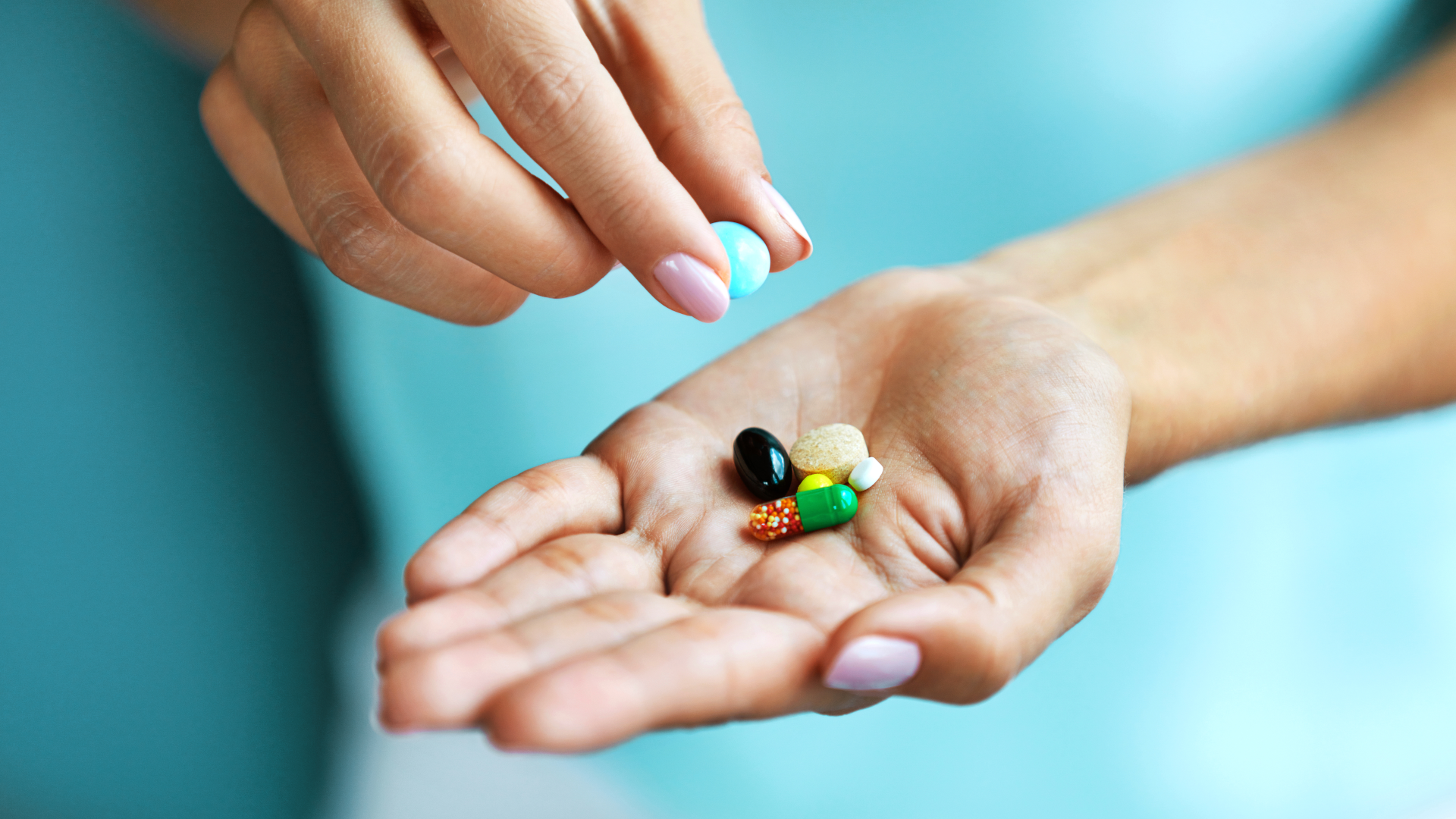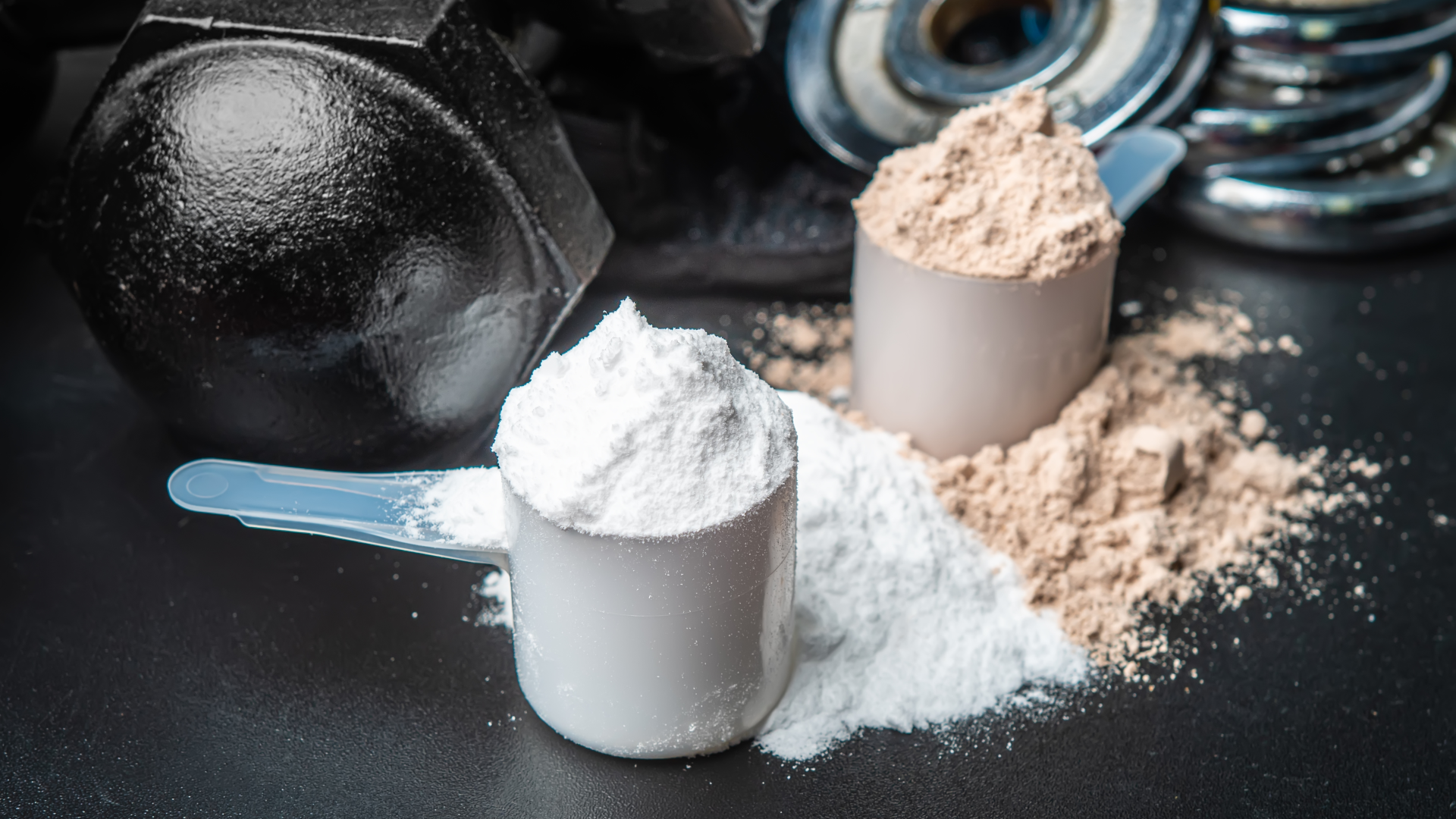Grab your cheat sheet… |
Creatine supplementation has long been used by athletes and exercise lovers to aid in building lean muscle mass and strength as well as softening the blow of recovery times after a hard session.
It's taken by top bodybuilders, American football players and everyone from elite to amateur sportsmen and women.
But what exactly is creatine?
Will it help you lose weight?
Or does taking creatine lead to unwanted weight gain?
Let's get the full lowdown so you can decide what's best for your weight loss journey.
What is Creatine?
Creatine is a natural compound that is found in small amounts in certain foods such as meat and fish, but it is also found in our muscles and brain.
It’s one of the tens of thousands of proteins within our bodies and is closely associated with creating and strengthening muscles.
It is crucial in energy production, particularly during high-intensity exercise or activities requiring short power bursts. Athletes use synthetic creatine to smash their workout routines and recoup well afterward.
What is the role of creatine in the body?
Creatine is primarily stored in skeletal muscle tissue, acting as a ready supply of energy during intense physical exercise.
When you undertake activities that need powerful and explosive movements like sprinting or perform activities that require quick and explosive movements, such as weightlifting or sprinting, the stored creatine phosphate is rapidly converted into ATP. This ATP then fuels muscle contractions, allowing you to generate more power and perform at a higher intensity.
Additionally, creatine has been shown to have other roles in the body.
It may contribute to increased muscle protein synthesis, essential for muscle repair and growth after exercise. Creatine also has potential neuroprotective and antioxidant properties, although further research is needed to understand these effects fully.
In summary, creatine is a naturally occurring compound that is vital in energy production and muscle function. It helps supply the muscles with ATP during intense physical activity, increasing power and performance.
What is Creatine Monohydrate?
Creatine monohydrate is a frequently used form of creatine supplement that consists of creatine plus one molecule of water, resulting in the name "monohydrate."
It's used by gymgoers and athletes who want to enhance muscle mass, increase their strength, and improve their performance and recovery times.
Creatine is naturally produced in the body and stored in the muscles as phosphocreatine.
During intense training, phosphocreatine is broken down to generate ATP, the primary energy source for muscle contractions. However, the phosphocreatine stores in the muscles are limited, and they can become depleted during short bursts of intense effort, such as weightlifting or sprinting, so people take creatine monohydrate as supplements to top up their levels.
The International Society of Sports Nutrition has stated that there's no strong evidence to suggest any negative effects of creatine monohydrate supplementation.
Creatine monohydrate's primary function is to aid in creating energy whilst high-intensity exercise is undertaken.
What are the Benefits of Creatine?
Let's examine the benefits of taking creatine supplements and the science that backs them.
Increased Muscle Strength
Creatine supplements have been shown to enhance muscular strength, allowing you to lift heavier weights or perform more repetitions during resistance training exercises.
This can lead to greater gains in muscle size and strength over time - great for those hoping to gain muscle mass.

There's a ton of compelling evidence from studies backing these claims. One review of 22 studies found that resistance training with creatine led to an average increase in the relative strength of muscles, approximately 8% greater than that achieved through training alone.
So, in terms of increased strength, research suggests creatine can be an effective strategy during resistance training exercises.
Improved Exercise Performance
Creatine supplements can replenish creatine stores in the muscles, thus enhancing high-intensity exercise performance. This is especially true of workouts that include short bursts of intense effort like weightlifting or sprinting.
So, with stronger muscles comes better workouts, and anaerobic capacity also improves.
Increased Muscle Mass
Creatine has been associated with an increase in lean muscle mass. This can have aesthetic and functional benefits, as greater muscle mass can improve overall body composition and physical performance.
Enhanced Muscle Recovery
This is one of the aspects of creatine you are familiar with already and why so many athletes and gymgoers are already taking creatine supplements.
Studies have backed that creatine may help to accelerate recovery and reduce muscle damage following intense exercise. By replenishing ATP stores and supporting muscle protein synthesis, creatine can aid in repairing and regenerating muscle tissue.
Injury prevention
There is research to suggest that oral creatine supplements reduce muscle cramping, muscle injuries, dehydration and injuries of the muscles.

Cognition and brain health
Studies suggest that creatine supplementation might improve cognitive processing in people influenced by acute stressors such as sleep deprivation and chronic pathological conditions like Alzheimer's and aging.
Nails and Skin
Creatine has been linked to enhanced nail strength as well as faster-growing and stronger nails.
It also has hydrating properties, which prevent nail dryness.
In terms of the skin, creatine has been shown to have antioxidant properties, which may help reduce the appearance of wrinkles and fine lines. It may also aid in collagen production, promoting skin elasticity.
Creatine helps the skin retain its moisture, making it hydrated. This can contribute to better-looking skin.
Sarcopenia and bone health
Creatine might help counteract age-related declines in skeletal muscle and bone mineral density.
Does Creatine Help With Weight Loss?
There's no doubt that it has a lot of health benefits for the body and mind.
But can creatine help you lose weight?
Or will it increase your weight?
Let's find out the facts.
When it comes to understanding the relationship between creatine and weight loss, there is a ton of ongoing research and scientific studies available - and still being explored.
Creatine is primarily used as a supplement to enhance powder, endurance and muscle strength. It's not specifically formulated or used for weight loss.
However, you can hit your weight loss goals combined with a regular workout program, a balanced diet and optimum hydration combined with creatine supplements.
Why?
If exercise performance and recovery improve with use, you can work harder and better, burning more calories and returning to your workouts faster and fresher.

If your overall workout performance improves, you will burn more calories as your endurance and strength improve.
So, creatine isn't going to directly burn body fat, but its inclusion within your daily routine will decrease fat mass in general, as weight all over the body is lost.
Start making some changes in your daily life, like meal prepping to get organized and get in shape quicker.
Will Creatine Help Me Lose Body Fat?
Because creatine isn't a weight loss supplement and shouldn't be treated as such, it can't be said that it will specifically help you lose body fat.
But the use of creatine during your workouts does mean there is a good chance you will enable more calorie expenditure, which results in the burning of calories, included in this - body fat.
By achieving a nutrient and mineral-rich diet, regular exercise and a calorie deficit, you'll be on track to hit your weight loss goals.
Try working out smarter, like drinking a sports nutrition Ultimate CRN-5 supplement before your workouts, setting you up for a great workout, hitting your goals and feeling charged after.
How Does Creatine Affect Body Composition?
Creatine has been studied extensively in relation to its effects on body composition.
What is meant by "body composition" is the proportion of different tissues in the body like bone mass, fat mass and muscle mass.
What influence does creatine have on the body?
Increased Muscle Mass
We know this one - creatine enhances muscle mass. It's been shown to increase intramuscular and phosphocreatine stores that can promote muscle growth and strength.
This increased muscle mass can create a more sculpted body composition by increasing the lean muscle mass proportions in your overall body weight.
Reduced Fat Mass
Modest decreases in body weight have been noted. The speculation comes from creatine indirectly contributing to fat loss as it increases energy expenditure and the resting metabolic rate.

Less fat means a more toned and honed physique.
Water Retention
This usually occurs in bloating, changing the body composition for a while. But this is temporary as the body retains water as it enters the muscle cells, too.
Can creatine make me gain weight?
Yes, it can.
Great news for those who want to put on some mass. But also not necessarily bad news for those who want to lose weight either.

Here's why.
Studies demonstrate that you can gain weight rapidly when you take creatine, especially if you use a loading phase. For example, a 2003 study found that after 30 days of high-dose creatine supplementation, the participants gained an average of 3.75 pounds.
It's important to note that it isn't about fat levels increasing. Creatine doesn't contain calories, and it doesn't make you gain body fat. Its use means your body will probably store more water, which will appear as weight gain when you stand on the scales.
It's simply just water retention.
Is Creatine Bad For You?
Generally, creatine consumption is safe for the average person to take and won't hurt if taken as directed.
However, like with all supplements, some side effects have been noted, ranging from slight to severe.
- Some people experience muscle cramps, digestive issues like diarrhea stomach cramps and dehydration (as creatine retains water). By changing your dosage or pausing on your supplements, these will subside. Drinking plenty of water is always a good idea if you're taking creatine supplements.
In rare cases, there have been some limited links between creatine and kidney damage, liver damage and kidney stones. But further studies are required.
It all comes down to pre-existing conditions and individual response. It's worth going to your healthcare provider first before introducing a new supplement into your routine.
How do you take creatine (and how much should you take)?
Creatine also helps you to maintain more power and explosivity at the gym. This can be especially helpful if you're trying to lose weight and feeling sluggish on your calorie deficit.
The timing is down to personal preference, but there are some standard approaches that most people follow.
Creatine Loading Phase
Some people start with a "loading phase" to quickly saturate the muscles with creatine. This phase means you take around 20 grams of creatine a day.
Maintenance phase
Here, after the loading phase is complete, you take lower daily doses to maintain your optimal creatine levels.
Daily Dosing
Another approach is to not do the loading phase and just begin with a daily dose of 3-5 grams. Creatine levels are gradually increased in the muscles over time.
How much creatine should I take?
You’ve probably seen people sipping on shakes in the gym and there’s a good chance they contain creatine. This form of sports nutrition comes in the form of a powder which is usually dissolved into other liquids or blended in a premixed product like our Ultimate CRN-5 supplement.
FYI: The standard dietary creatine intake is recommended as three to five grams per day, based on your specific body weight.
Should I take creatine?
When you look at all the health benefits of creatine and its regular use by sprinters, football and hockey players, as well as ripped gym goers, consuming creatine could be a great way to bring new energy and recovery to your workouts.
It's not going to bring rapid weight loss but it will bring a boost in athletic performance and muscular endurance.
]It's best to start with a popular choice like Crazy Nutrition’s CRN-5 creatine formula.
This creatine supplement is made for people who want to hit their workouts hard, get the best results, burn max calories and keep hydrated throughout.
Think boosted energy, lean muscle mass and being ready for more of the same again.



